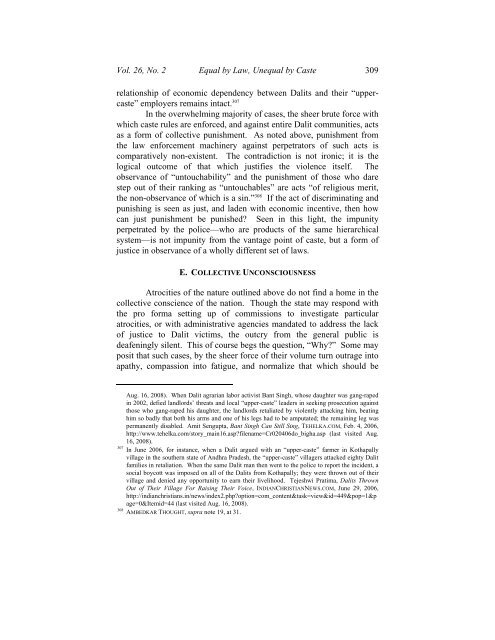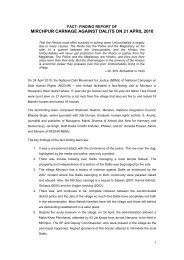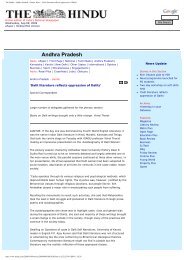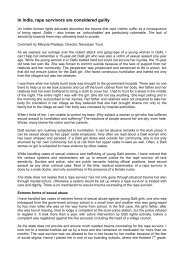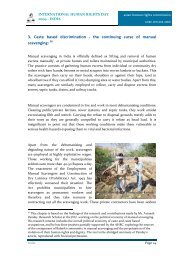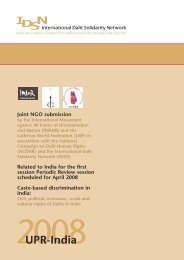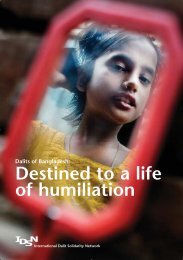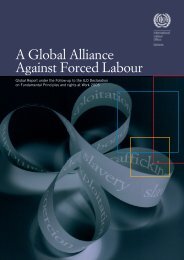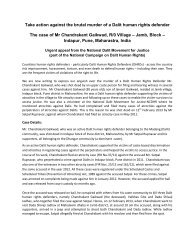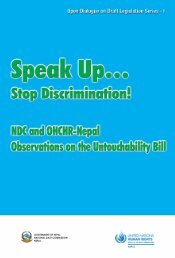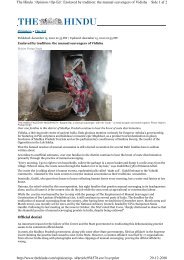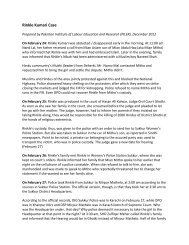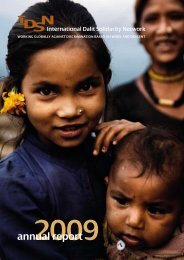308 Wisconsin <strong>International</strong> Law Journal“SC/ST orgns to campaign for reservation in Kerala;” 299 “SC/ST hostelstudents go on an indefinite fast;” 300 “Protestors block Delhi-DehradunNational highway;” 301 “PIL [Public Interest Litigation] moved in HC[High Court] <strong>by</strong> <strong>Dalit</strong> outfit.” 302Hidden beneath the headlines are the parallel stories of resilienceand retaliation. It has been suggested that the rise in violence against<strong>Dalit</strong>s since the early 1990s is a direct reaction to increasing resistanceon the part of <strong>Dalit</strong>s to defy the social order and demand their basicrights, on the streets and in the courtrooms. 303 The retaliation, which inmany instances is directed at entire <strong>Dalit</strong> communities, seeks to send aclear message that <strong>Dalit</strong>s should not dare to step outside their karmicallyprescribed duties and occupations. 304 The very nature of the violencesignals the dehumanization of <strong>Dalit</strong>s as lesser humans and speaks to theuse of violence as <strong>caste</strong> entrenchment. 305 The use of sexual violenceagainst <strong>Dalit</strong> women signals the perception of <strong>Dalit</strong> women as “sexuallyavailable,” 306 while the use of economic boycotts ensures that a299 SC/ST Orgns to Campaign for Reservation in Kerala, ZEENEWS.COM, Oct. 3, 2007,http://www.zeenews.com/articles.asp?aid=398811&archisec=REG (last visited Aug. 16, 2008)(reporting on campaign for safeguarding SC/ST reservations and comprehensive land reform).300 Tamil Nadu, SC/ST Hostel Students Go on an Indefinite Fast, THE HINDU, Sept. 28, 2007,available at http://www.hindu.com/2007/09/28/stories/2007092852680300.htm (last visited Aug.16, 2008) (describing fasting <strong>by</strong> SC/ST hostel students to protest “infrastructure weaknesses” inhostel).301 Fake Encounter—Protestors Block Delhi-Dehradun NH, HINDUSTAN TIMES, Sept. 19, 2007,available at http://www.hindustantimes.com/StoryPage/StoryPage.aspx?id=79ed951d-a714-4a74-85bb-be7bc61af10c&&Headline=Protestors+block+Delhi-Dehradun+National+highway(last visited Aug. 16, 2008) (describing protest <strong>by</strong> <strong>Dalit</strong>s of police shooting of <strong>Dalit</strong> youth in“fake encounter”).302 PIL Moved in HC <strong>by</strong> <strong>Dalit</strong> Outfit, CHENNAIONLINE.COM, Sept. 21, 2007 (reporting challenge tocourt order denying permission to <strong>Dalit</strong> organization to protest denial of <strong>Dalit</strong> entry toKandampatti Draupadi Amman Temple).303 Press Release, Human Rights Watch, Violence Against “Untouchables” Growing, Says Report(Apr. 1, 1999) available at http://hrw.org/english/docs/1999/04/14/india879.htm.304 When <strong>Dalit</strong>s from the <strong>Dalit</strong> colony of Veludavur village in Villapuram district, Tamil Nadu,demanded their right to participate in a government auction of common properties in Veludavur,members of seven neighboring “upper-<strong>caste</strong>” Hindu villages attacked their colony. Theydestroyed four hundred huts, attacked women, children, and the elderly, and displaced sevenhundred <strong>Dalit</strong> families. BROKEN PEOPLE, supra note 21, at 112-13.305 Take for example the case of a <strong>Dalit</strong> man from the Dholapur district of Rajasthan, a westernIndian state. For the “crime” of refusing to sell bidis (hand-rolled cigarettes) on credit to thenephew of an “upper-<strong>caste</strong>” village chief, the “upper-<strong>caste</strong>” family forcibly pierced his nostril,drew a string through his nose, and paraded him around the village, eventually tying him to acattle post. Id. at 24.306 When a sixteen-year-old <strong>Dalit</strong> rape survivor from Sahalwada village in Madhya Pradesh, refusedto withdraw the complaint she had filed against her attacker, he retaliated <strong>by</strong> pouring kerosene onher and setting her on fire. <strong>Dalit</strong> Girl Burnt to Death <strong>by</strong> Man Accused of Rape, ZEENEWS.COM,Nov. 23, 2006, http://www.zeenews.com/articles.asp?aid=337515&archisec=REG (last visited
Vol. 26, No. 2 Equal <strong>by</strong> Law, Un<strong>equal</strong> <strong>by</strong> Caste 309relationship of economic dependency between <strong>Dalit</strong>s and their “upper<strong>caste</strong>”employers remains intact. 307In the overwhelming majority of cases, the sheer brute force withwhich <strong>caste</strong> rules are enforced, and against entire <strong>Dalit</strong> communities, actsas a form of collective punishment. As noted above, punishment fromthe <strong>law</strong> enforcement machinery against perpetrators of such acts iscomparatively non-existent. The contradiction is not ironic; it is thelogical outcome of that which justifies the violence itself. Theobservance of “untouchability” and the punishment of those who darestep out of their ranking as “untouchables” are acts “of religious merit,the non-observance of which is a sin.” 308 If the act of discriminating andpunishing is seen as just, and laden with economic incentive, then howcan just punishment be punished? Seen in this light, the impunityperpetrated <strong>by</strong> the police—who are products of the same hierarchicalsystem—is not impunity from the vantage point of <strong>caste</strong>, but a form ofjustice in observance of a wholly different set of <strong>law</strong>s.E. COLLECTIVE UNCONSCIOUSNESSAtrocities of the nature outlined above do not find a home in thecollective conscience of the nation. Though the state may respond withthe pro forma setting up of commissions to investigate particularatrocities, or with administrative agencies mandated to address the lackof justice to <strong>Dalit</strong> victims, the outcry from the general public isdeafeningly silent. This of course begs the question, “Why?” Some mayposit that such cases, <strong>by</strong> the sheer force of their volume turn outrage intoapathy, compassion into fatigue, and normalize that which should beAug. 16, 2008). When <strong>Dalit</strong> agrarian labor activist Bant Singh, whose daughter was gang-rapedin 2002, defied landlords’ threats and local “upper-<strong>caste</strong>” leaders in seeking prosecution againstthose who gang-raped his daughter, the landlords retaliated <strong>by</strong> violently attacking him, beatinghim so badly that both his arms and one of his legs had to be amputated; the remaining leg waspermanently disabled. Amit Sengupta, Bant Singh Can Still Sing, TEHELKA.COM, Feb. 4, 2006,http://www.tehelka.com/story_main16.asp?filename=Cr020406do_bigha.asp (last visited Aug.16, 2008).307 In June 2006, for instance, when a <strong>Dalit</strong> argued with an “upper-<strong>caste</strong>” farmer in Kothapallyvillage in the southern state of Andhra Pradesh, the “upper-<strong>caste</strong>” villagers attacked eighty <strong>Dalit</strong>families in retaliation. When the same <strong>Dalit</strong> man then went to the police to report the incident, asocial boycott was imposed on all of the <strong>Dalit</strong>s from Kothapally; they were thrown out of theirvillage and denied any opportunity to earn their livelihood. Tejeshwi Pratima, <strong>Dalit</strong>s ThrownOut of Their Village For Raising Their Voice, INDIANCHRISTIANNEWS.COM, June 29, 2006,http://indianchristians.in/news/index2.php?option=com_content&task=view&id=449&pop=1&page=0&Itemid=44 (last visited Aug. 16, 2008).308 AMBEDKAR THOUGHT, supra note 19, at 31.
- Page 1 and 2:
EQUAL BY LAW, UNEQUAL BY CASTE: THE
- Page 3 and 4: Vol. 26, No. 2 Equal by Law, Unequa
- Page 5 and 6: Vol. 26, No. 2 Equal by Law, Unequa
- Page 7 and 8: Vol. 26, No. 2 Equal by Law, Unequa
- Page 9 and 10: Vol. 26, No. 2 Equal by Law, Unequa
- Page 11 and 12: Vol. 26, No. 2 Equal by Law, Unequa
- Page 13 and 14: Vol. 26, No. 2 Equal by Law, Unequa
- Page 15 and 16: Vol. 26, No. 2 Equal by Law, Unequa
- Page 17 and 18: Vol. 26, No. 2 Equal by Law, Unequa
- Page 19 and 20: Vol. 26, No. 2 Equal by Law, Unequa
- Page 21 and 22: Vol. 26, No. 2 Equal by Law, Unequa
- Page 23 and 24: Vol. 26, No. 2 Equal by Law, Unequa
- Page 25 and 26: Vol. 26, No. 2 Equal by Law, Unequa
- Page 27 and 28: Vol. 26, No. 2 Equal by Law, Unequa
- Page 29 and 30: Vol. 26, No. 2 Equal by Law, Unequa
- Page 31 and 32: Vol. 26, No. 2 Equal by Law, Unequa
- Page 33 and 34: Vol. 26, No. 2 Equal by Law, Unequa
- Page 35 and 36: Vol. 26, No. 2 Equal by Law, Unequa
- Page 37 and 38: Vol. 26, No. 2 Equal by Law, Unequa
- Page 39 and 40: Vol. 26, No. 2 Equal by Law, Unequa
- Page 41 and 42: Vol. 26, No. 2 Equal by Law, Unequa
- Page 43 and 44: Vol. 26, No. 2 Equal by Law, Unequa
- Page 45 and 46: Vol. 26, No. 2 Equal by Law, Unequa
- Page 47 and 48: Vol. 26, No. 2 Equal by Law, Unequa
- Page 49 and 50: Vol. 26, No. 2 Equal by Law, Unequa
- Page 51 and 52: Vol. 26, No. 2 Equal by Law, Unequa
- Page 53: Vol. 26, No. 2 Equal by Law, Unequa
- Page 58 and 59: 312 Wisconsin International Law Jou
- Page 60 and 61: 314 Wisconsin International Law Jou
- Page 62 and 63: 316 Wisconsin International Law Jou
- Page 64 and 65: 318 Wisconsin International Law Jou
- Page 66 and 67: 320 Wisconsin International Law Jou
- Page 68 and 69: 322 Wisconsin International Law Jou
- Page 70 and 71: 324 Wisconsin International Law Jou
- Page 72 and 73: 326 Wisconsin International Law Jou
- Page 74 and 75: 328 Wisconsin International Law Jou
- Page 76 and 77: 330 Wisconsin International Law Jou
- Page 78 and 79: 332 Wisconsin International Law Jou
- Page 80 and 81: 334 Wisconsin International Law Jou
- Page 82 and 83: 336 Wisconsin International Law Jou
- Page 84 and 85: 338 Wisconsin International Law Jou
- Page 86 and 87: 340 Wisconsin International Law Jou
- Page 88 and 89: 342 Wisconsin International Law Jou


